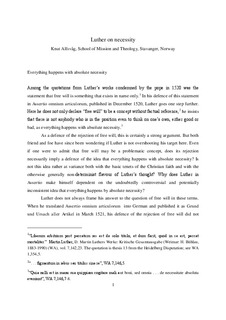| dc.contributor.author | Alfsvåg, Knut | |
| dc.date.accessioned | 2015-05-07T09:16:55Z | |
| dc.date.accessioned | 2016-04-22T09:22:40Z | |
| dc.date.available | 2015-05-07T09:16:55Z | |
| dc.date.available | 2016-04-22T09:22:40Z | |
| dc.date.issued | 2015 | |
| dc.identifier.citation | Harvard Theological Review 2015, 108(1):52-69 | nb_NO |
| dc.identifier.issn | 1475-4517 | |
| dc.identifier.uri | http://hdl.handle.net/11250/2386966 | |
| dc.description | - | nb_NO |
| dc.description.abstract | Among the quotations from Luther's works condemned by the pope in 1520 was the statement that free will is something that exists in name only. In his defense of this statement in Assertio omnium articulorum, published in December 1520, Luther goes one step further. Here he not only declares “free will” to be a concept without factual reference, he even insists that there is no one in the position even to think on one's own, either good or bad, as everything happens with absolute necessity. | nb_NO |
| dc.language.iso | eng | nb_NO |
| dc.relation.uri | http://journals.cambridge.org/action/displayAbstract?fromPage=online&aid=9544741&fileId=S0017816015000036 | |
| dc.title | Luther on Necessity | nb_NO |
| dc.type | Journal article | nb_NO |
| dc.date.updated | 2015-05-07T09:16:55Z | |
| dc.subject.nsi | VDP::Humaniora: 000::Teologi og religionsvitenskap: 150 | nb_NO |
| dc.subject.nsi | VDP::Humanities: 000::Theology and religious studies: 150 | nb_NO |
| dc.identifier.doi | http://dx.doi.org/10.1017/S0017816015000036 | |
| dc.identifier.cristin | 1227017 | |
| dc.subject.keyword | God | |
| dc.subject.keyword | Luther, Martin | |
| dc.subject.keyword | predestination | |
